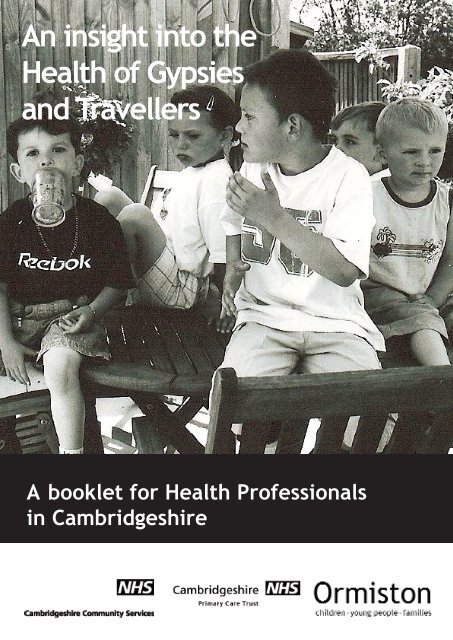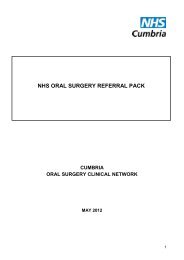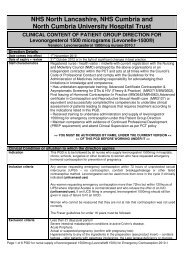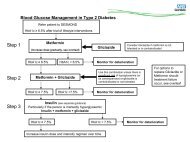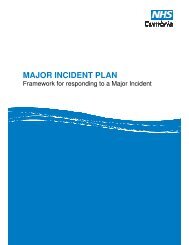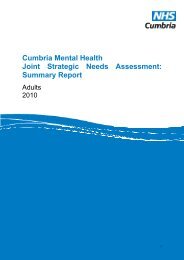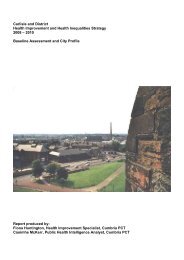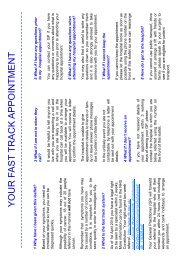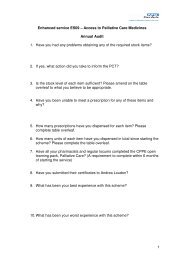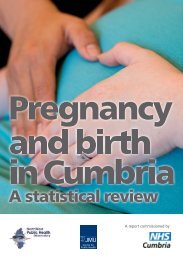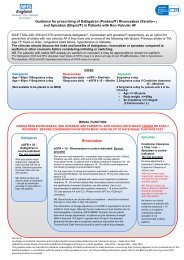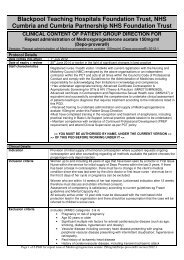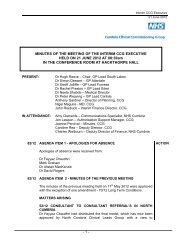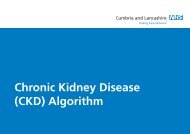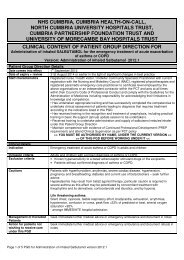Cambridgeshire Health Booklet - NHS Cumbria
Cambridgeshire Health Booklet - NHS Cumbria
Cambridgeshire Health Booklet - NHS Cumbria
Create successful ePaper yourself
Turn your PDF publications into a flip-book with our unique Google optimized e-Paper software.
An insight into the<br />
<strong>Health</strong> of Gypsies<br />
and Travellers<br />
A booklet for <strong>Health</strong> Professionals<br />
in <strong>Cambridgeshire</strong>
An insight into the<br />
<strong>Health</strong> of Gypsies and Travellers<br />
A booklet for <strong>Health</strong> Professionals<br />
in <strong>Cambridgeshire</strong>
Jointly published in electronic and printed format by Ormiston Children & Families Trust and<br />
<strong>Cambridgeshire</strong> Community Services:<br />
Ormiston Children & Families Trust<br />
333 Felixstowe Road<br />
IPSWICH<br />
IP3 9BU<br />
Tel: 01473 724517<br />
Fax: 01473 274255<br />
email: enquiries@ormiston.org<br />
www.ormiston.org<br />
Registered charity no. 1015716<br />
<strong>Cambridgeshire</strong> Community Services<br />
The Priory<br />
Priory Road<br />
ST IVES<br />
Cambs<br />
PE27 5BB<br />
Tel: 01480 308222<br />
Fax: 01480 308234<br />
Text<br />
© Copyright Ormiston Children & Families Trust, 2008<br />
© Copyright <strong>Cambridgeshire</strong> Community Services, 2008<br />
Photographs<br />
© Copyright Ormiston Children & Families Trust<br />
All rights reserved. No part of this publication may be reproduced or transmitted in any<br />
form or by any electronic, mechanical or other means, including photocopying and<br />
recording, or in any information storage or retrieval system, without prior permission in<br />
writing from the publisher.<br />
Photographic consents expire June 2009 and this document may not be (re)printed after<br />
this date unless new permissions are obtained by Ormiston Children & Families Trust.<br />
Acknowledgements<br />
. The Gypsies and Travellers who identified the issues they wanted health professionals to know<br />
about.<br />
. Content agreed and completed by Claire Harris (<strong>Cambridgeshire</strong> Community Services), John Souter<br />
and Jacqueline Bolton (Ormiston Children & Families Trust).<br />
. Layout and editing by Amanda Davies (Ormiston Children & Families Trust).<br />
. Quotes and pictures courtesy of Gypsy and Traveller children living in <strong>Cambridgeshire</strong> who took part<br />
in Children’s voices: changing futures, a research project undertaken by Ormiston Children &<br />
Families Trust and funded by the <strong>Cambridgeshire</strong> Children’s Fund.<br />
. Case Studies courtesy of Ormiston Travellers Initiative Advocacy Service. Names have been<br />
changed to protect the identity of the Gypsies and Travellers featured.<br />
. Photographs courtesy of Gypsy and Traveller children living in <strong>Cambridgeshire</strong>, their parents and<br />
Ormiston Children & Families Trust.<br />
. Local research by Cate Treise.<br />
. Employees from <strong>Cambridgeshire</strong> Primary Care Trust and <strong>Cambridgeshire</strong> Community Services, the<br />
<strong>Cambridgeshire</strong> Travellers <strong>Health</strong> Sub-Group Meeting (co-ordinated by <strong>Cambridgeshire</strong> PCT), and<br />
the Ormiston Emotional Wellbeing Steering Group, who all took part in consultations regarding the<br />
contents of this booklet.<br />
. Department of <strong>Health</strong> Section 64 funding for the Ormiston Travellers Emotional Wellbeing Project.<br />
3
Contents<br />
Introduction 5<br />
Who are <strong>Cambridgeshire</strong>’s Gypsies<br />
and Travellers? 6<br />
Gypsies and Travellers and<br />
<strong>Health</strong> Care 8<br />
Appointments<br />
Family <strong>Health</strong><br />
Gypsy and Traveller Hygiene<br />
Language Differences<br />
Home Visits 11<br />
Primary Care 12<br />
Hospitals 13<br />
Privacy<br />
Visitors<br />
Meals<br />
Discharging Patients<br />
Childbirth, Ante-natal and<br />
Pre-natal Care 15<br />
Young Gypsies and Travellers 17<br />
Emotional Wellbeing and Mental <strong>Health</strong> 18<br />
Bereavement and Funerals 20<br />
What can you do as a<br />
health professional? 22<br />
References, further reading<br />
and useful contacts 23<br />
Index 25<br />
4
Introduction<br />
This booklet is aimed at primary care,<br />
secondary care, hospital and community staff,<br />
but may also be useful for other allied health<br />
professionals.<br />
It sets out information about individuals from<br />
Gypsy and Travelling communities in relation<br />
to their health and health care. It has been<br />
developed as a guide for health professionals<br />
to help them understand how and why<br />
members of Gypsy and Travelling communities<br />
may behave in certain ways regarding their<br />
health.<br />
It also sets out issues for health professionals<br />
to consider when working with individuals from<br />
Gypsy and Travelling communities. Key areas<br />
to note are important areas around literacy,<br />
hygiene and cultural issues around gender,<br />
which are mentioned throughout this booklet.<br />
The information included in this<br />
booklet is intended as guidance and<br />
may not apply to all the individuals<br />
from Gypsy and Travelling<br />
communities that health professionals<br />
work with.<br />
5
Who are <strong>Cambridgeshire</strong>’s<br />
Gypsies and Travellers?<br />
Romany people have lived in England for over<br />
500 years, and Irish Travellers have lived here<br />
since the 19th Century. In <strong>Cambridgeshire</strong>,<br />
records dating back to 1515 make reference to<br />
Gypsies(1).<br />
Whilst there are no reliable figures for the<br />
numbers of Gypsies and Travellers in Britain<br />
today - they are not counted by the Census,<br />
figures estimate a total Gypsy and Traveller<br />
population of 300,000 (CRE, 2004).<br />
The Eastern Region has 11% of the general<br />
population of Gypsies and Travellers in<br />
England - making them one of the largest<br />
minority ethnic groups. An estimated 6,500 -<br />
7,000 Gypsies and Travellers live in<br />
<strong>Cambridgeshire</strong>. Over 50% of the Gypsies and<br />
Travellers living in <strong>Cambridgeshire</strong> live in<br />
houses(2).<br />
Many Gypsies and Travellers living in<br />
<strong>Cambridgeshire</strong> today have historic links<br />
with the county.<br />
The Gypsies and Travellers living in the UK are<br />
made up of many different groups:<br />
. Romany Gypsies<br />
. Irish Travellers<br />
. Scottish Travellers<br />
. Welsh Travellers<br />
. New Travellers<br />
. Circus and Fairground people<br />
. Bargees<br />
each with their own lifestyle, culture and<br />
traditions. They may be settled in housing,<br />
living on private or local authority sites, or<br />
homeless with no place to stop. They may<br />
travel all year round, seasonally or not at all.<br />
Many experience prejudice and discrimination<br />
and misconceptions about Gypsies and<br />
Travellers can prevent them from being able<br />
to receive services such as healthcare, access<br />
to education, and suitable accommodation.<br />
(1) In 1515 C. H. Coopers Annals of Cambridge recorded payments in the borough of Cambridge and makes references to<br />
Gypsies. (Information from <strong>Cambridgeshire</strong> Archives Service, <strong>Cambridgeshire</strong> County Council - Breaking Barriers.<br />
See www.cambridgeshire.gov.uk)<br />
(2) Cambridge Sub-Region Traveller Needs Assessment. (Robert Home and Margaret Greenfields, 2006)<br />
6
English Romany Gypsies and Irish Travellers are<br />
recognised as ethnic minorities under the Race<br />
Relations Act 1989. The ethnic status of Gypsy,<br />
Roma and Irish Travellers is unaffected by<br />
where they live - whether it is mobile<br />
accommodation or permanent housing.<br />
You can find out more about Gypsies and<br />
Travellers and the myths that surround<br />
their way of life from Ormiston’s leaflet<br />
‘Gypsies and Travellers: Fact or Fiction?’<br />
which is available from www.ormiston.org<br />
The health problems of Gypsies and Travellers<br />
can be complex and are often caused by, or<br />
made worse by, where they live and/or their<br />
living conditions.<br />
Traditionally, Gypsy and Traveller attitudes to<br />
health care include a belief in self-reliance or<br />
reliance on family, a suspicion of health<br />
services and a belief that they can’t do any<br />
good anyway(3).<br />
It is important for health care<br />
professionals working with<br />
individuals from Gypsy and Travelling<br />
communities to have an understanding<br />
of Gypsy and Traveller Culture and<br />
appropriate ways to act and<br />
communicate.<br />
(3) The <strong>Health</strong> Status of Gypsies and Travellers in England: A Report to the Department of <strong>Health</strong> (University of Sheffield, 2004)<br />
7
Gypsies and Travellers<br />
and <strong>Health</strong> Care<br />
Many perceive Gypsies and Travellers as living<br />
a romantic and care-free life of their choice.<br />
The reality is they are more prone to ill-health<br />
than other groups, are five times more likely<br />
to have health problems, and have a life<br />
expectancy 10-12 years less than the settled<br />
population.<br />
One in five Gypsy and Traveller mothers will<br />
experience the loss of a child, compared to<br />
one in a hundred in the settled community,<br />
and levels of pre-natal mortality and still birth<br />
are also higher(4).<br />
Life expectancy is<br />
10-12 years less<br />
than that of the<br />
settled population.<br />
The <strong>Health</strong> Status of Gypsies and Travellers in England,<br />
University of Sheffield, 2004<br />
Bob and Marie’s Story<br />
In their early 50’s and with grown up<br />
children, Bob and Marie* have travelled all<br />
their lives. Their grandchildren attend their<br />
local school, and as they are experiencing<br />
failing health and finding it harder to find<br />
places to stay they have indicated a wish to<br />
live a more settled life.<br />
The Ormiston Travellers Initiative Advocacy<br />
Service helped them to apply for planning<br />
permission on a piece of land they had<br />
bought, and supported them to register with<br />
a GP. Bob had not seen a doctor since losing<br />
an eye in an accident at two years of age.<br />
His advocate encouraged him to go for a<br />
health check, whereupon Bob discovered<br />
he had dangerously high blood pressure<br />
and diabetes. Marie was diagnosed with<br />
arthritis. Both are now receiving health<br />
care. Bob’s life-threatening conditions<br />
have been stabilised as a result.<br />
* Names have been changed to protect identity<br />
(4) The <strong>Health</strong> Status of Gypsies and Travellers in England: A Report to the Department of <strong>Health</strong> (University of Sheffield, 2004)<br />
8
Lack of understanding of Gypsy and Traveller<br />
culture and needs, coupled with unstable<br />
accommodation can make it difficult for<br />
Gypsies and Travellers to receive healthcare(5).<br />
When a health professional or service is<br />
identified as being good, Gypsies and<br />
Travellers may revisit and use this service and<br />
may travel great distances to do so. It is felt<br />
that this person can be trusted and valued,<br />
and this person often comes to be seen as a<br />
good friend.<br />
Appointments<br />
When attending health care appointments<br />
Gypsies and Travellers may be accompanied by<br />
other family members. This is for support and<br />
in case they encounter prejudice.<br />
Gypsies and Travellers may miss appointments.<br />
This is not intended to be disrespectful, and<br />
there are many reasons why appointments are<br />
missed. The main reason is eviction, but<br />
missed appointments could also be down to<br />
poor literacy and/or cultural differences. For<br />
example, many Gypsies and Travellers may not<br />
use calendars or diaries, and lifestyles may not<br />
be based around the usual 9.00am - 5.00pm<br />
timings.<br />
Gypsies and Travellers may also have different<br />
priorities. For example the whole community is<br />
expected to attend a Traveller funeral without<br />
exception, and if a man is offered work he will<br />
take it and all the family will travel with him.<br />
Consider alternatives to written<br />
communication. It is better to remind<br />
Gypsies and Travellers about any<br />
appointments they have by phone<br />
or face-to-face.<br />
For Gypsies and<br />
Travellers living in<br />
a house is associated<br />
with long-term<br />
illness, poorer health<br />
state and anxiety.<br />
Those who rarely<br />
travel have the<br />
poorest health.<br />
The <strong>Health</strong> Status of Gypsies and Travellers in England,<br />
University of Sheffield, 2004<br />
(5) The <strong>Health</strong> Status of Gypsies and Travellers in England: A Report to the Department of <strong>Health</strong> (University of Sheffield, 2004)<br />
9
Language differences<br />
It is important to note that differences in<br />
language and understanding may impact on<br />
your work with individuals from Gypsy and<br />
Travelling communities. It is important that<br />
health professionals do not use jargon.<br />
Gypsies and Travellers will often take a lead<br />
from other people’s behaviour, particularly if<br />
they can’t read. For example if they see others<br />
smoking in a particular area they may assume<br />
it is OK to smoke there.<br />
Family <strong>Health</strong> Care<br />
Men and women from Gypsy and Travelling<br />
communities may gather separately to focus on<br />
specific needs. Men and women’s issues are<br />
often discussed separately and dealt with in<br />
different ways. For example, if a woman has a<br />
new baby breastfeeding may not be discussed<br />
in front of men.<br />
It can be useful to check people’s<br />
understanding following a discussion<br />
or consultation.<br />
Information leaflets are not always<br />
appropriate due to difficulties with<br />
literacy. Consider other forms of<br />
providing information such as audio<br />
tape, video or dvd.<br />
Gypsy and Traveller Hygiene<br />
Most Gypsies and Travellers have high<br />
standards of hygiene, and elaborate rituals of<br />
cleanliness. For example they will use separate<br />
bowls for washing dishes, clothes, and food<br />
preparation, as well as different parts of the<br />
body. This is important to note if treating a<br />
Gypsy or Traveller in their home or particularly<br />
if treating them at a hospital session.<br />
It may be useful to have a sensitive<br />
discussion with patients to explain<br />
about treatment and to understand<br />
their hygiene routines.<br />
10
Home Visits<br />
For ambulance and health service staff it is<br />
perfectly appropriate for standard risk<br />
assessment procedures to be used but it is<br />
not necessary to be accompanied by the police<br />
when making a home visit. The suggestion that<br />
this would be necessary may be seen as highly<br />
insulting and disrespectful.<br />
Gypsies and Travellers may feel proud and<br />
protective of their home. Please respect this.<br />
It is good practice to ask about taking<br />
your shoes off when entering a Gypsy<br />
or Traveller’s caravan or house.<br />
Be aware that bathroom and toilet facilities<br />
are considered a personal space and some<br />
Gypsies and Travellers may feel uncomfortable<br />
about a visitor using, or asking to use, them.<br />
Appointments can be unusual for members of<br />
Gypsy and Travelling communities, so even if<br />
you plan to visit at a set time that patient may<br />
wait in all day.<br />
It might help to be thoughtful of this<br />
when planning appointments, and<br />
arranging to visit early in the day.<br />
11
Primary Care<br />
Many individuals from Gypsy and Travelling<br />
communities may not feel comfortable going<br />
to a doctor’s surgery, hospital, office or other<br />
place of authority and may be accompanied by<br />
at least one family member. This can be due to<br />
a number of reasons:<br />
. bad experiences in the past<br />
. the expectation that they will be<br />
treated badly<br />
. insecurity or lack of confidence<br />
. lack of literacy.<br />
Gypsy and Traveller women may prefer to<br />
have a female doctor, particularly as there are<br />
cultural issues which are relevant if issues such<br />
as sexual health - for example smear tests,<br />
breast health, pregnancy, and symptoms of the<br />
menopause - are to be discussed. (See Family<br />
<strong>Health</strong> Care, pg. 10.)<br />
In primary care a detailed oral<br />
explanation of how to take any<br />
prescribed medication would be<br />
useful, as there may well be<br />
literacy issues in reading instructions.<br />
A recent study by Patrice van Cleemput on<br />
access to and experiences of primary care<br />
for Gypsies and Travellers includes some<br />
useful information about requirements for<br />
culturally safe services.<br />
A copy of the report is available to<br />
download from the Ormiston website at<br />
www.ormiston.org or the <strong>Cambridgeshire</strong><br />
Primary Care Trust website at<br />
www.cambridgeshirepct.nhs.uk<br />
Markie’s Story<br />
Markie* is a young man who suffers from<br />
depression and anxiety. He was prescribed<br />
night time medication to help him sleep and<br />
to reduce his anxiety. He was told to take<br />
three 10mg tablets every night. His Mum<br />
looked after the tablets and made sure he<br />
took them. Markie’s literacy is not good and<br />
neither is his Mum’s, and they made sure<br />
the people at the surgery were aware of<br />
this. Markie was improving gradually but<br />
then started to feel worse for no real<br />
reason. He felt tired, lethargic and believed<br />
his medication wasn’t helping him. He told<br />
the people treating him and they suggested<br />
he take an extra dose of his mood stabilising<br />
medication during the day to see if that<br />
helped.<br />
The Ormiston Travellers Initiative Advocacy<br />
Service supported Markie to tell the<br />
consultant he wasn’t happy and to ask<br />
for his medication to be reviewed. The<br />
consultant contacted the surgery and<br />
went through the details of what was being<br />
dispensed. It was found that the night time<br />
medication had been changed and the dose<br />
of each of the tablets was now 30mg.<br />
Markie and his Mum had not been told,<br />
couldn’t read the packaging and Markie had<br />
been taking three times his prescribed dose<br />
at night. In addition he had taken an extra<br />
one in the daytime as he had confused the<br />
night time tablets with the mood stabilising<br />
tablets, due to them being supplied in<br />
blister packs without their branded packets.<br />
* Names have been changed to protect identity<br />
12
Hospitals<br />
Individuals from Gypsy and Travelling<br />
communities often go to Accident and<br />
Emergency in order to access health care.<br />
There are a number of reasons for this:<br />
. they may be unable to register with a<br />
doctor’s surgery<br />
. lack of information about services available<br />
or they are unaware of services<br />
. a lack of literacy to read information and<br />
a reluctance to admit this<br />
. unable to read medication packets<br />
. unable to read first aid books or access<br />
or read the Internet<br />
. a lack of clear understanding of what is<br />
said when attending a clinic, due to jargon<br />
and medication terms being used that are<br />
not understood.<br />
Gypsies and<br />
Travellers may<br />
prefer to sit in a<br />
chair beside the<br />
hospital bed -<br />
a bed in hospital is<br />
seen as synonymous<br />
with death.<br />
Gypsies and Travellers may not like being left<br />
alone in hospital. They can feel vulnerable on<br />
their own as a Gypsy or Traveller, as they may<br />
come up against prejudice and may not understand<br />
things. They may get frightened and<br />
worry that someone will give them the wrong<br />
medication on purpose.<br />
Gypsies and Travellers are used to being<br />
outside so may find it difficult being confined<br />
in a room in a hospital.<br />
It may be helpful to try and place<br />
patients from Gypsy and Travelling<br />
communities near an entrance or in<br />
a single room if one is available.<br />
This may help meet the needs of the<br />
large number of visitors that may visit<br />
the patient whilst they are in hospital.<br />
13
Privacy<br />
Most women from Gypsy and Travelling<br />
communities would prefer to see a female<br />
health professional for any appointments.<br />
Initimate issues are usually discussed in the<br />
presence of peers and members of the same<br />
sex only.<br />
Privacy is extremely important. It would not be<br />
appropriate for bed covers to be removed from<br />
a patient if there are other Gypsies and<br />
Travellers or other people in the room.<br />
Gypsies and Travellers may feel very<br />
uncomfortable in clothes and sheets provided<br />
by the hospital due to cultural views around<br />
cleanliness.<br />
Even if visitors are unable to see the patient,<br />
they may be found around the hospital or in<br />
the hospital grounds as being close by is<br />
important.<br />
Meals<br />
Gypsies and Travellers may be unwilling to eat<br />
hospital food and may eat food brought in by<br />
friends and relatives. This is because they<br />
know this food has been prepared correctly<br />
according to their cultural views.<br />
To avoid the wrong food being eaten,<br />
it will be helpful to make it clear if<br />
the patient must eat a special diet, or<br />
if the patient should not eat at all due<br />
to impending surgery.<br />
You should consider allowing<br />
patients from Gypsy and Travelling<br />
communities to use their own clothes<br />
and own bed sheets if at all possible.<br />
Putting medical instruments on the<br />
table where meals are served should<br />
be avoided.<br />
Visitors<br />
It is expected that family and friends will visit<br />
anyone in hospital in large numbers. It is<br />
suggested that wherever possible you should:<br />
. make use of a close relative to act as a<br />
mediator to reduce the numbers visiting<br />
and to make visiting arrangements<br />
. place the patient in a single room, if<br />
possible near to the entrance to avoid<br />
as much disturbance to others as possible<br />
. in the case of a terminally ill patient, or<br />
where death seems very likely it might be<br />
important to note that there may well be<br />
large numbers of visitors and vehicles<br />
arriving from across the country to visit<br />
this person.<br />
Discharging Patients<br />
Gypsies and Travellers may need more support<br />
at discharge as they may not be able to read<br />
instructions on health care leaflets or<br />
prescriptions.<br />
14
Childbirth, Ante-natal and<br />
Pre-natal Care<br />
It has been a tradition within Gypsy and<br />
Travelling communities that fathers do not<br />
attend childbirth, and in many cases of childbirth<br />
this may still be the case. Pregnancy<br />
aftercare and breastfeeding is traditionally<br />
not discussed in front of men or strangers.<br />
Men may disappear when the midwife or<br />
health visitor visit the new mother and baby.<br />
After childbirth many mothers may wish to<br />
leave hospital as soon as possible despite being<br />
offered longer term in-patient care. This is<br />
because they want to get away from the<br />
hospital environment, which they may feel<br />
is dirty, and to get back to their families.<br />
It is common for mothers from Gypsy and<br />
Travelling communities to dispense with<br />
breastfeeding in favour of bottle feeding, due<br />
to privacy issues with men and women. If the<br />
baby is breastfed, this is unlikely to be done in<br />
front of strangers.<br />
One in five Gypsy<br />
and Traveller mothers<br />
will experience<br />
the loss of a child.<br />
The <strong>Health</strong> Status of Gypsies and Travellers in England,<br />
University of Sheffield, 2004<br />
One in five Gypsy and Traveller mothers will<br />
experience the loss of a child. This compares<br />
to one in a hundred in the settled community.<br />
Levels of pre-natal mortality and stillbirth are<br />
also higher(6).<br />
Children are often cared for by extended<br />
family members. This is for practical reasons<br />
as communities may not always be in one<br />
place.<br />
Gypsies and Travellers have<br />
significant problems accessing health and<br />
maternity care and suffer a disproportionate<br />
number of health problems as a result.<br />
Maternity Alliance, 2005<br />
(6) The <strong>Health</strong> Status of Gypsies and Travellers in England: A Report to the Department of <strong>Health</strong> (University of Sheffield, 2004)<br />
15
Children from Gypsy<br />
and Travelling<br />
communities are<br />
between 1 1 / 2<br />
and 2 times more<br />
likely to die in the<br />
first year of life than<br />
children in the<br />
settled community.<br />
International Minority Rights Group<br />
A recent study by Patrice van Cleemput on<br />
access to and experiences of primary care<br />
for Gypsies and Travellers includes some<br />
useful information about requirements for<br />
culturally safe services.<br />
A copy of the report is available to<br />
download from the Ormiston website at<br />
www.ormiston.org or the <strong>Cambridgeshire</strong><br />
Primary Care Trust website at<br />
www.cambridgeshirepct.nhs.uk<br />
Lack of access to ante-natal care, possibly due<br />
to missed appointments (see pg. 9), coupled<br />
with the impact and stress of evictions has a<br />
detrimental effect on the health of mothers,<br />
babies and children. Mothers from Gypsy and<br />
Travelling communities experience the highest<br />
incidence of maternal death in childbirth.<br />
Women living on the roadside have significant<br />
problems getting post-natal care (Maternity<br />
Alliance).<br />
Mobile or home phone reminders<br />
would be seen as helpful in order to<br />
improve attendance at ante-natal care<br />
sessions.<br />
16
Young Gypsies and<br />
Travellers<br />
“It’s dangerous for<br />
our baby brother.<br />
If we were on the<br />
side of the road he<br />
couldn’t play outside<br />
the trailer in case<br />
a car hit him.”<br />
Jemma, 11 - Children’s voices: changing futures<br />
The views and experiences of young Gypsies<br />
and Travellers<br />
Young Gypsies and Travellers may be kept away<br />
from drugs and sex-awareness sessions at<br />
school. Education in these areas is considered<br />
inappropriate by parents as they feel that<br />
awareness of them may lead to risk-taking<br />
behaviour.<br />
The younger generation would not normally be<br />
expected to discuss gender or sex issues with<br />
the older generation, and young Gypsies and<br />
Travellers would not normally get sex<br />
education from their parents. Young Gypsies<br />
and Travellers may feel very uncomfortable in<br />
any situation where they would be expected to<br />
change or undress in front of strangers or<br />
others.<br />
Child accident rates are thought to be higher<br />
than average for Gypsy and Traveller<br />
children(7), and many have speculated that this<br />
high accident rate is due to the poor condition<br />
and location of local authority sites and<br />
unauthorised stopping places(8).<br />
Most Gypsy and Traveller parents want a better<br />
future for their children and many will seek a<br />
more settled lifestyle while their children<br />
attend school. However evictions, racism and<br />
bullying can prevent children’s attendance and<br />
inhibit their achievements. In 1999 Ofsted<br />
reported that ‘Gypsies and Travellers have the<br />
lowest results of any ethnic minority group and<br />
are the group most at risk in the education<br />
system(9).<br />
(7) <strong>Health</strong> of the Roma People - a review of the published literature in The Journal of Epidermal Community <strong>Health</strong>, vol 54<br />
pg 864-869 (Hajioff and McKee, 2000)<br />
(8) Gypsy and Traveller Communities: Accommodation, Education, <strong>Health</strong>, Skill and Employment - An East of England<br />
Perspective (C Warrington and S Peck, 2005)<br />
(9) Raising the Achievement of Minority Ethnic Pupils (Ofsted, 1999)<br />
17
Emotional Wellbeing and<br />
Mental <strong>Health</strong><br />
Many Gypsies and Travellers live with huge<br />
anxiety caused by the constant fear of<br />
eviction, the need to find somewhere to stop,<br />
racism, discrimination and poor access to<br />
health services and medical care. Many stress<br />
related illnesses are linked to the problems<br />
caused by homelessness, and exacerbated by<br />
the lack of sites or the location of sites.<br />
Those who are homeless may have to stop in<br />
unsuitable places and face frequent evictions<br />
which can be a frightening and stressful<br />
experience, especially for children.<br />
“Getting moved from<br />
place to place ... you<br />
have to stay in laybys<br />
and you get really<br />
frightened.”<br />
Inadequate facilities and poor<br />
accommodation affect the health and<br />
wellbeing of Gypsies and Travellers.<br />
Gypsy and Traveller families have a reduced<br />
life expectancy, a range of chronic health<br />
conditions and a high rate of disability. There<br />
are high levels of stress on carers and poor<br />
psychological health. Depression stems from a<br />
complex mixture of ill health, bereavements<br />
and everyday fears and experiences of<br />
prejudice, racism and institutional racism(10).<br />
Research shows there is insufficient<br />
accommodation for <strong>Cambridgeshire</strong>’s Gypsies<br />
and Travellers, meaning some have to camp on<br />
unauthorised sites or to purchase and develop<br />
land before the planning process is completed,<br />
simply because there is no where else to go(11).<br />
Children living on a transient site are more<br />
vulnerable to poor environments and air<br />
pollution and suffer related illnesses ...<br />
children need more opportunity for theraputic<br />
play(12).<br />
Thomas, 8 - Children’s voices: changing futures<br />
The views and experiences of young Gypsies<br />
and Travellers<br />
(10) & (12) Report of the <strong>Health</strong> and Site Needs of Transient Gypsies and Travellers of Leeds (Marion M Horton Associates, 2004)<br />
(11) Cambridge Sub-Region Traveller Needs Assessment (Robert Home and Margaret Greenfields, 2006)<br />
18
Alfie’s Story<br />
In his late teens Alfie* had been badly<br />
beaten up whilst enjoying a night out in his<br />
local town. Although his physical injuries<br />
healed he was left very emotionally unwell<br />
and had nightmares, flashbacks and panic<br />
attacks. He was too afraid to leave the<br />
caravan site where he lived and stopped<br />
working or socialising. He was so unwell his<br />
GP referred him to the local Community<br />
Mental <strong>Health</strong> Team where his consultant<br />
psychiatrist suggested he write down his<br />
experiences and read them over every day -<br />
to help him come to terms with what had<br />
happened. Alfie’s literacy was not good as<br />
he had not received a full education. He<br />
found the need to read and write was a<br />
barrier to his getting better.<br />
The Ormiston Travellers Initiative Advocacy<br />
Service attended appointments with Alfie<br />
and suggested to the therapist that Alfie<br />
record his experience on audio tape and<br />
listen to it every day instead. This worked<br />
well and subsequently a plan was developed<br />
to encourage Alfie to start venturing out<br />
into the community on his own.<br />
The Ormiston Travellers Initiative Advocacy<br />
Service also supported Alfie to get a referral<br />
to a psychologist who is now providing<br />
regular talking therapy sessions.<br />
“The women linked<br />
psychological distress<br />
to poor living<br />
conditions, economic<br />
factors, loss of family<br />
support, bereavement,<br />
marital/parenting<br />
issues and social<br />
pressures ... there was<br />
a strong tradition of<br />
problem-solving within<br />
family groups and a<br />
reluctance to seek<br />
help outside the<br />
community.”<br />
Improving Mental <strong>Health</strong> Services for Travellers<br />
in <strong>Cambridgeshire</strong>, Cate Treise and Geoff Shepherd,<br />
Cambridge and Peterborough Mental <strong>Health</strong> Partnership<br />
<strong>NHS</strong> Trust, 2005<br />
Alfie now has a girlfriend, is more<br />
independent and confident and is hoping<br />
to set up his own home and return to work<br />
soon.<br />
* Names have been changed to protect identity<br />
19
Bereavement and<br />
Funerals<br />
Gypsies and Travellers may gather in large<br />
numbers when a member of the family or<br />
community is seriously ill, and relatives may<br />
stay close by the patient the whole time. If a<br />
patient does die many family and friends may<br />
expect to visit the hospital and go to the home<br />
to support the bereaved family with the loss.<br />
Many family members may also come to the<br />
hospital when the body is due to be placed in<br />
the coffin.<br />
A death is experienced deeply by extended<br />
family and the whole community, as well as<br />
the immediate family.<br />
It is traditional for relatives as well as friends<br />
to stay awake throughout the night at the<br />
bedside or home of the deceased. It is also<br />
very important if at all possible for family and<br />
close friends to be present at the moment of<br />
death.<br />
It is expected that children would be absented<br />
from school for some time to be able to attend<br />
a funeral and to support the family. This may<br />
entail travelling a long distance and staying<br />
with the family.<br />
Men may gather separately to the women at<br />
this time.<br />
Taking care of the grave is important and<br />
it is customary for the grave to be visited<br />
regularly - often daily - to pay respects,<br />
remembrance, place flowers and ensure<br />
tidiness. This may go on for many years and<br />
people may congregate in cemetaries as part<br />
of their daily routine.<br />
It has been traditional for close family to wear<br />
black for 12 months from the day of the<br />
funeral, sometimes longer.<br />
20
A death is<br />
experienced deeply<br />
by extended family<br />
and the whole<br />
community, as well as<br />
the immediate family.<br />
Families may refer to the departed family<br />
member in the present tense for many years<br />
after their death and to identify property as<br />
still belonging to that person.<br />
It may seem that disproportionate amounts<br />
of moneyare spent on the funeral and headstone.<br />
It is highly disrespectful to walk on the<br />
grave.<br />
Sally’s Story<br />
In her early 20’s, Sally* lived on a local<br />
authority Gypsy Caravan Site. Her emotional<br />
wellbeing was affected when her dearly<br />
beloved brother took his own life. Many<br />
of the immediate and extended family felt<br />
guilty and ashamed of what had happened<br />
and Sally who was suffering very badly went<br />
to her GP for support. He referred her to<br />
the local Community Mental <strong>Health</strong> Team<br />
where she received a medication review and<br />
was offered talking therapy.<br />
The person supporting Sally had some<br />
experience of working with Gypsies and<br />
Travellers but was very worried about Sally -<br />
who was attending her brother’s grave daily<br />
for a long time after his death. It was felt<br />
within the team that this was excessive<br />
behaviour and they were thinking Sally<br />
should be sectioned for her own protection.<br />
The Ormiston Travellers Initiative Advocacy<br />
Service gave information and support to the<br />
Community Mental <strong>Health</strong> Team and<br />
explained that daily visits to graves for<br />
recently bereaved people from Gypsy and<br />
Travelling communities was quite common.<br />
The team were able to treat Sally without<br />
sectioning her and she made a full recovery.<br />
* Names have been changed to protect identity<br />
21
What can you do as a<br />
health professional?<br />
. Have an awareness of the cultural issues<br />
of Travelling communities. Attend cultural<br />
awareness training sessions, but remember<br />
to treat all Gypsies and Travellers as<br />
individuals.<br />
. Involve Gypsies and Travellers in training<br />
health service staff and in awarenessraising<br />
sessions.<br />
. Consider how cultural issues may impact<br />
on the health and health behaviour of<br />
individuals from Gypsy and Travelling<br />
communities.<br />
. Keep Gypsies and Travellers informed about<br />
decisions that affect their lives. Explain<br />
clearly what you are doing and why, and<br />
how long treatment will take and services<br />
will last.<br />
. Consider how you may reduce some of the<br />
barriers to accessing health care, such as:<br />
- ensuring all services are accessible and<br />
user-friendly<br />
- considering outreach services as having<br />
to travel and a lack of transport can be<br />
a barrier to accessing services<br />
- being friendly positive and open<br />
yourself when working with Gypsies<br />
and Travellers<br />
- talking to families to find out why they<br />
may not be accessing mainstream services<br />
. Work in partnership with other<br />
organisations who are already working<br />
with individuals from Gypsy and Travelling<br />
communities. For example Traveller<br />
Education Services and the Ormiston<br />
Travellers Initiative.<br />
. Give clear and thorough explanations of<br />
how prescribed drugs should be taken,<br />
including information such as:<br />
- how many to take<br />
- when to take them<br />
- how long to take them for.<br />
. Read the documents listed on page 23 to<br />
find out more.<br />
The University of Sheffield’s 2004 report,<br />
The <strong>Health</strong> Status of Gypsies and Travellers in<br />
England: A report to the Deparment of <strong>Health</strong>,<br />
also recommends:<br />
. partnerships between Gypsies and<br />
Travellers and health workers<br />
. employing specialist Gypsy and Traveller<br />
health workers<br />
. identifying Gypsies and Travellers in<br />
ethnic monitoring<br />
. increasing GP registration.<br />
A recent study by Patrice van Cleemput on access to and experiences of primary care for Gypsies and<br />
Travellers includes some useful information about requirements for culturally safe services.<br />
A copy of the report is available to download from the Ormiston website at www.ormiston.org or<br />
the <strong>Cambridgeshire</strong> Primary Care Trust website at www.cambridgeshirepct.nhs.uk<br />
22
References, further reading and useful contacts<br />
References<br />
(1) In 1515 C. H. Coopers Annals of Cambridge recorded payments in the borough of Cambridge and<br />
makes references to Gypsies. (Information from <strong>Cambridgeshire</strong> Archives Service, <strong>Cambridgeshire</strong><br />
County Council - Breaking Barriers. See www.cambridgeshire.gov.uk)<br />
(2) Cambridge Sub-Region Traveller Needs Assessment. (Robert Home and Margaret Greenfields, 2006.<br />
Available from the Cambridge County Council website at www.cambridgeshire.gov.uk)<br />
(3) The <strong>Health</strong> Status of Gypsies and Travellers in England: A Report to the Department of <strong>Health</strong><br />
(University of Sheffield, 2004<br />
(4) The <strong>Health</strong> Status of Gypsies and Travellers in England: A Report to the Department of <strong>Health</strong><br />
(University of Sheffield, 2004)<br />
(5) The <strong>Health</strong> Status of Gypsies and Travellers in England: A Report to the Department of <strong>Health</strong><br />
(University of Sheffield, 2004)<br />
(6) The <strong>Health</strong> Status of Gypsies and Travellers in England: A Report to the Department of <strong>Health</strong><br />
(University of Sheffield, 2004)<br />
(7) <strong>Health</strong> of the Roma People - a review of the published literature in The Journal of Epidermal<br />
Community <strong>Health</strong>, vol 54 pg 864-869 (Hajioff and McKee, 2000)<br />
(8) Gypsy and Traveller Communities: Accommodation, Education, <strong>Health</strong>, Skill and Employment -<br />
An East of England Perspective (C Warrington and S Peck, 2005)<br />
(9) Raising the Achievement of Minority Ethnic Pupils (Ofsted, 1999)<br />
(10) Report of the <strong>Health</strong> and Site Needs of Transient Gypsies and Travellers of Leeds (Marion M Horton<br />
Associates, 2004)<br />
(11) Cambridge Sub-Region Traveller Needs Assessment (Robert Home and Margaret Greenfields, 2006)<br />
(12) Report of the <strong>Health</strong> and Site Needs of Transient Gypsies and Travellers of Leeds (Marion M Horton<br />
Associates, 2004)<br />
Further Reading<br />
. The <strong>Health</strong> Status of Gypsies and Travellers in England: A Report to the Department of <strong>Health</strong><br />
(University of Sheffield, 2004)<br />
. Making a Difference (Traveller <strong>Health</strong> Partnership)<br />
. Gypsy and Traveller Communities: Accommodation, Education, <strong>Health</strong>, Skills and Employment -<br />
An East of England Perspective (C Warrington and S Peck, 2005)<br />
. A Better Road - An information booklet for health care and other profesionals (Available from<br />
www.grtleeds.co.uk)<br />
. Improving mental health services for Travellers in <strong>Cambridgeshire</strong> (C Treise and G Shepherd, 2005)<br />
. Gypsies and Travellers: Fact or Fiction? - <strong>Cambridgeshire</strong>’s Gypsies and Travellers challenge the<br />
myths surrounding their way of life (Ormiston Children & Families Trust. Available from<br />
www.ormiston.org)<br />
. Children’s voices: changing futures (C. Warrington, 2006. Available from Ormiston Children &<br />
Families Trust)<br />
. Disability, Social Care, <strong>Health</strong> and Travelling People (R Morris and L Clements, Traveller Law<br />
Research Unit, Cardiff Law School, 2001)<br />
. Improving Mental <strong>Health</strong> Services for Travellers in <strong>Cambridgeshire</strong> (C Treise and G Shepherd,<br />
Cambridge and Peterborough Mental <strong>Health</strong> Partnership <strong>NHS</strong> Trust, 2005)<br />
. East <strong>Cambridgeshire</strong> and Fenland Travellers <strong>Health</strong> Needs Assessment (S Wood, <strong>Cambridgeshire</strong> PCT,<br />
2006. Available from Ormiston Travellers Initiative and <strong>Cambridgeshire</strong> Traveller <strong>Health</strong> Sub-Group.)<br />
23
Useful contacts<br />
Ormiston Travellers Initiative<br />
(<strong>Cambridgeshire</strong>)<br />
01480 496577<br />
www.ormiston.org<br />
Ormiston Travellers Initiative (Norfolk)<br />
01362 854264<br />
www.ormiston.org<br />
Ormiston’s Travellers Initiatives provides a range of<br />
activities aimed at supporting Gypsy and Traveller<br />
children, young people and their families, and ensures<br />
that communities are involved in relevant consultation<br />
with service providers, giving opportunities to<br />
influence service development and delivery.<br />
Jacqueline Bolton<br />
Programme Development Manager<br />
Ormiston Children & Families Trust<br />
Children & Young People from Gypsies and<br />
Travelling Communities<br />
01480 496577<br />
jacqueline.bolton@ormiston.org<br />
<strong>Cambridgeshire</strong> County Council Traveller<br />
Liaison Officer<br />
01223 699148<br />
<strong>Cambridgeshire</strong> Traveller Education Service<br />
01223 508700<br />
<strong>Cambridgeshire</strong> Community Services<br />
01480 308222<br />
<strong>Cambridgeshire</strong> Primary Care Trust<br />
01223 884008<br />
www.cambridgeshirepct.nhs.uk/<br />
<strong>Cambridgeshire</strong> Traveller <strong>Health</strong> Sub-Group<br />
(<strong>Cambridgeshire</strong> PCT)<br />
01223 884105<br />
jean.fosbeary@cambridgeshirepct.nhs.uk<br />
The <strong>Cambridgeshire</strong> Traveller <strong>Health</strong> Sub-Group provides<br />
a forum through which providers and commissioners<br />
of services that impact on Travellers health in<br />
<strong>Cambridgeshire</strong> can work in partnership to influence<br />
strategy and policy in order to improve health outcomes<br />
and reduce health inequalities.<br />
Training providers<br />
Myriad Consultants<br />
01462 643212<br />
www.myriadconsultancy.co.uk<br />
The Gypsy Media Company<br />
07966 786242<br />
info@englishunlimited.co.uk<br />
Friends, Families, Travellers<br />
www.gypsy-traveller.org<br />
24
Index<br />
Accident and Emergency 13<br />
Accidents 17<br />
Ambulance 11<br />
Ante-natal Care 15, 16<br />
Anxiety 18<br />
Appointments 9, 10, 16<br />
Attitudes to <strong>Health</strong> Care 7<br />
Babies 16<br />
Bargees 6<br />
Bathrooms 11<br />
Bed Covers 14<br />
Bereavement 18, 20, 21<br />
Bottle Feeding 15<br />
Breastfeeding 10, 13<br />
Breasts 12<br />
<strong>Cambridgeshire</strong> Population 6<br />
<strong>Cambridgeshire</strong>’s Gypsies and Travellers 6, 18<br />
Caravans 11<br />
Case Study 8, 12, 19, 21<br />
Childbirth 15<br />
Children 17, 18<br />
Circus and Fairground People 6<br />
Cleanliness 10, 14<br />
Contacts 24<br />
Culture 7, 8, 12, 22<br />
Diet 14<br />
Disability 18<br />
Discharge 14<br />
Doctors 12, 13, 22<br />
Drugs 17<br />
Eastern Region Population 6<br />
Education 17<br />
Emotional Wellbeing 18<br />
Ethnic Monitoring 22<br />
Ethnic Status 7<br />
Eviction 9, 16, 18<br />
Family <strong>Health</strong> 10, 22<br />
Funerals 9, 20, 21<br />
Further Reading 22, 23<br />
GP Surgery 12, 13<br />
Graves 20<br />
Gypsy and Traveller Groups 6<br />
Gypsy and Traveller Population 6<br />
<strong>Health</strong> Care 8<br />
<strong>Health</strong> Problems – Causes 7, 8, 16<br />
<strong>Health</strong> Services 18<br />
History 6<br />
Home Visits 11<br />
Homelessness 18<br />
Hospital 10, 12, 13, 14, 20<br />
Housing 6, 10<br />
Hygiene 10<br />
Infant Death 8, 15, 16<br />
Irish Traveller 6, 7<br />
Jargon 13, 10<br />
Language 10<br />
Life Expectancy 8, 18<br />
Literacy 10, 13<br />
Meals 14<br />
Medical Instruments 14<br />
Medication 12, 13, 22<br />
Men’s Issues 10<br />
Menopause 12<br />
Mental <strong>Health</strong> 18<br />
Misconceptions 6, 7<br />
New Travellers 6<br />
Police 11<br />
Pregnancy 8, 12, 15<br />
Pre-natal Care 15<br />
Primary Care 12<br />
Privacy 14<br />
Race Relations Act 7<br />
Racism 18<br />
References 23<br />
Romany 6, 7<br />
Scottish Travellers 6<br />
Sex Education 17<br />
Sexual <strong>Health</strong> 12<br />
Site Location 17, 18<br />
Smear Tests 12<br />
Smoking 10<br />
Stillbirth and Pre-natal Mortality 8, 15, 16<br />
Stress-related Illness 18<br />
Toilet Facilities 11<br />
Training 22<br />
Travel 9<br />
Traveller Culture 7, 8, 12, 22<br />
Traveller Homes 10<br />
Travellers and <strong>Health</strong> Care 8<br />
Travellers Living in Housing 6<br />
Visitors 13, 14<br />
Washing 10<br />
Welsh Travellers 6<br />
Women’s Issues 10<br />
Young Gypsies and Travellers 17<br />
25
Ormiston Children & Families Trust works to promote the well being of children and young people, especially those<br />
disadvantaged by their life experiences or circumstances. This is achieved through direct service provision and by<br />
raising awareness of related issues through research, publications, conferences and events. Many of the children<br />
and young people we work with are:<br />
. experiencing stigma and isolation caused by prejudice and discrimination<br />
. in danger of becoming isolated and excluded both from school and the wider world<br />
. affected by the imprisonment of their parent<br />
. at risk of, or experiencing, emotional or physical harm<br />
. caring for parents or siblings within their family.<br />
We are one of the largest voluntary providers of support services to children and families in the Eastern Region.<br />
Ormiston opened its first project in 1981 and we currently have 29 community and prison-based projects across<br />
five counties.<br />
<strong>Cambridgeshire</strong> Community Services is responsible for providing a range of <strong>NHS</strong> and social care services in the<br />
<strong>Cambridgeshire</strong> area, commissioned by and accountable to <strong>Cambridgeshire</strong> Primary Care Trust. Our integrated<br />
health and social care community services are for children, older people and adults across <strong>Cambridgeshire</strong> and<br />
include:<br />
. fully integrated health and social care services for adults and older people (district nursing, care management,<br />
physiotherapy, occupational therapy and personal care)<br />
. specialist nursing and therapies<br />
. four community hospitals<br />
. children’s acute services at Hinchingbrooke Hospital, Huntingdon<br />
. children’s community services<br />
. diagnostic and outpatient clinics<br />
. minor injury and Huntingdonshire out-of-hours GP services<br />
. public health programmes.<br />
Produced by:<br />
© Copyright Ormiston Children & Families Trust, 2008<br />
© Copyright <strong>Cambridgeshire</strong> Community Services, 2008


